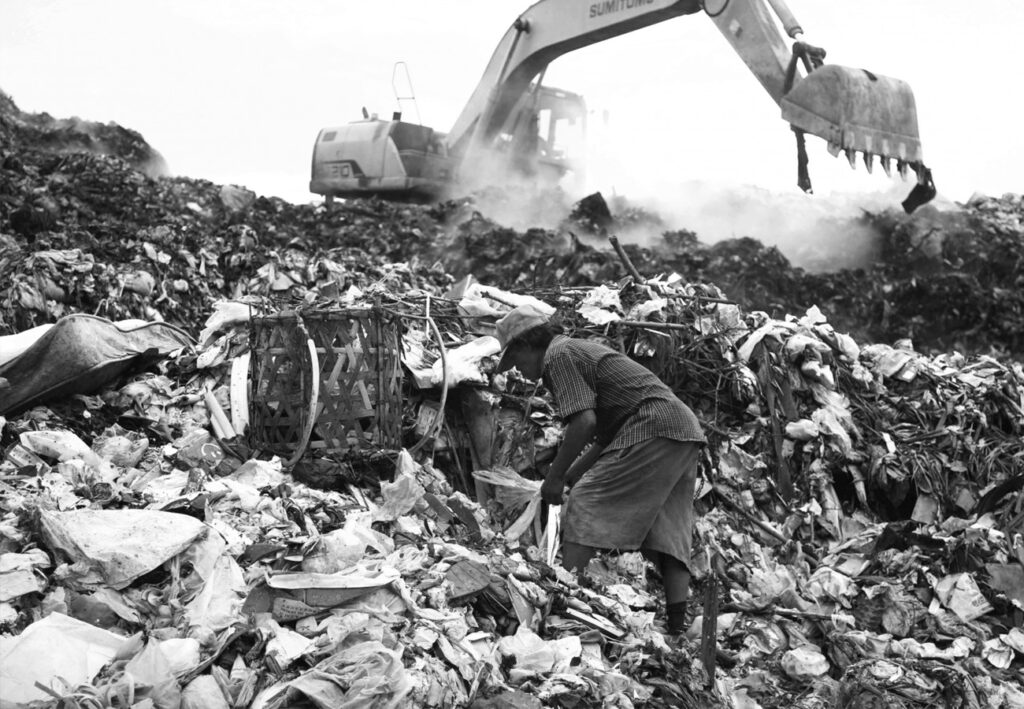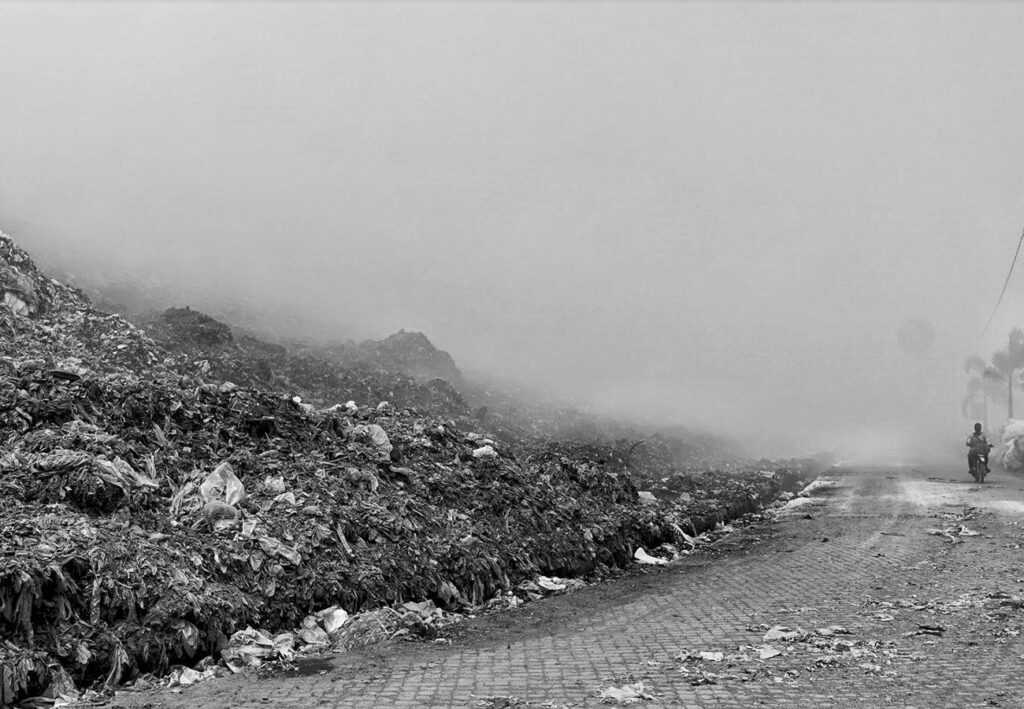
THE PUNCH RESOURCES
Preventing Landfill Fires & Promoting Sustainable Waste Management
Bali, Indonesia – November 9, 2023
After three weeks of ongoing fires, TPA Suwung is showing signs of improvement, with reduced smoke. TPA Suwung is one of the largest waste disposal sites in Bali, situated near popular tourist areas like Sanur and Kuta.
Approximately 70-80% of the waste at these sites is organic, and the combination of organic material decomposition alongside inorganic waste, high tropical temperatures, and over 100 consecutive days without rain has created ideal conditions for fires to erupt. As a result of the ongoing fires, new waste disposal has been limited, leading to a backlog of unprocessed waste.
Both public and private recycling facilities are currently operating at full capacity. The nearby community, located on the landfill’s periphery, has been exposed to significant health risks due to prolonged inhalation of toxic air in recent weeks.
In landfills, the interaction of organic and inorganic waste components creates a combustible scenario.
How does the decomposition of organic materials interact with inorganic waste to create favorable conditions for fires?
In landfills, the interaction of organic and inorganic waste components creates a combustible scenario. Organic waste, including items like food scraps and yard waste, undergoes decomposition, releasing heat and gases as byproducts, with methane being the most significant.
Meanwhile, inorganic waste, consisting of non-biodegradable materials like plastics and metals, forms a barrier that insulates the landfill. The heat generated from organic decomposition becomes trapped beneath this layer due to limited ventilation, resulting in heat accumulation. Additionally, the dry surface layer of the landfill becomes highly susceptible to ignition during extended periods without rainfall.
As organic materials break down, methane gas accumulates beneath the dry surface layer. Methane is highly combustible and can ignite when exposed to an external heat source, such as a spark, open flame, or smoldering fire. This can lead to spontaneous combustion, ultimately causing a landfill fire.

What are the impacts from landfill fires?
Landfill fires have extensive adverse effects on the environment, public health, and the community. When plastic waste ignites, it releases toxic fumes, worsening air quality issues on the island. These pollutants encompass particulate matter, volatile organic compounds, and hazardous gases. Exposure to smoke and these pollutants from landfill fires can result in respiratory problems, exacerbate pre-existing conditions, and heighten the risk of respiratory diseases among the affected population.
These fires also have environmental consequences, contaminating nearby water sources with hazardous chemicals, endangering human and aquatic life. Runoff from firefighting efforts can further pollute waterways. Additionally, landfill fires lead to soil contamination, impacting the local ecosystem and agriculture. They emit greenhouse gases like methane and carbon dioxide, contributing to climate change and global environmental issues while harming local ecosystems, wildlife, and plants.
Another significant impact is that, with waste unable to be transported to the landfill sites as usual, trash accumulates across the island. According to Bali Sun, over 750 tonnes of waste are stranded due to recycling facilities operating at near-maximum capacity. This highlights the urgent need for effective waste management solutions to address the growing challenge of waste buildup and ensure the environmental well-being of the region.

We, as a community, play a significant role in preventing landfill fires on the island.
How to prevent landfill fires?
Preventing landfill fires requires a collaborative community effort, including measures to reduce waste generation and ensure proper waste management. It begins with effective separation and sorting of waste at its source, minimizing the presence of hazardous materials in landfills.
As individuals, we can take several steps to minimize waste. First and foremost, we can reduce and reuse. Opting for products with minimal packaging and choosing reusable items like shopping bags, water bottles, and coffee cups significantly reduces waste generation. Proper recycling is crucial; following local recycling guidelines and ensuring that recyclables are clean and free of contaminants. Separating and sorting waste at its source also helps reduce dangerous materials in landfills.
Setting up a composting system for organic waste, such as food scraps and yard trimmings, diverts a substantial portion of waste from landfills while benefiting the environment.
Embracing a mindset of repairing and maintaining our belongings, instead of discarding them when they break, extends product lifespans and reduces the need for new purchases. Buying second-hand items, such as clothing and furniture, supports a circular economy and reduces waste. Choosing products made from sustainable materials and supporting environmentally conscious companies contributes to waste reduction. Finally, being mindful of consumption habits, avoiding impulse buying, and staying informed about environmental issues and their impact can motivate eco-conscious decisions.
For businesses, waste reduction starts with waste audits to pinpoint sources of waste within the organization. Once identified, strategies for reduction can be developed. This may encompass source reduction, such as minimizing packaging and optimizing processes to reduce waste generation. Comprehensive and well-communicated recycling programs should ensure proper sorting and disposal of recyclables by employees.
Introducing composting programs in workplace cafeterias and kitchens can address food and organic waste. Engaging with suppliers can reduce packaging and waste in the supply chain. In product design, businesses can focus on creating items with extended lifespans, easily repairable components, and recyclable materials. Transitioning to a circular economy model promotes reuse, refurbishment, remanufacturing, or recycling to extend product and material lifecycles.
Employee education is vital in waste reduction initiatives, with businesses encouraging staff participation. Donating surplus materials or products to charities and finding ways to reuse them within the organization can further reduce waste and benefit the community. Lastly, it’s essential for businesses to comply with waste management regulations and stay informed about changes in waste-related laws to uphold their commitment to sustainability.
By embracing sustainable practices and promoting responsible waste management, both individuals and businesses contribute to the creation of a safer and more environmentally conscious waste management system. This collaborative approach is essential to mitigating the risks associated with landfill fires and fostering a more sustainable future for our communities.
Key Bali partners to help manage your waste better:
EXPLORE THE PUNCH

